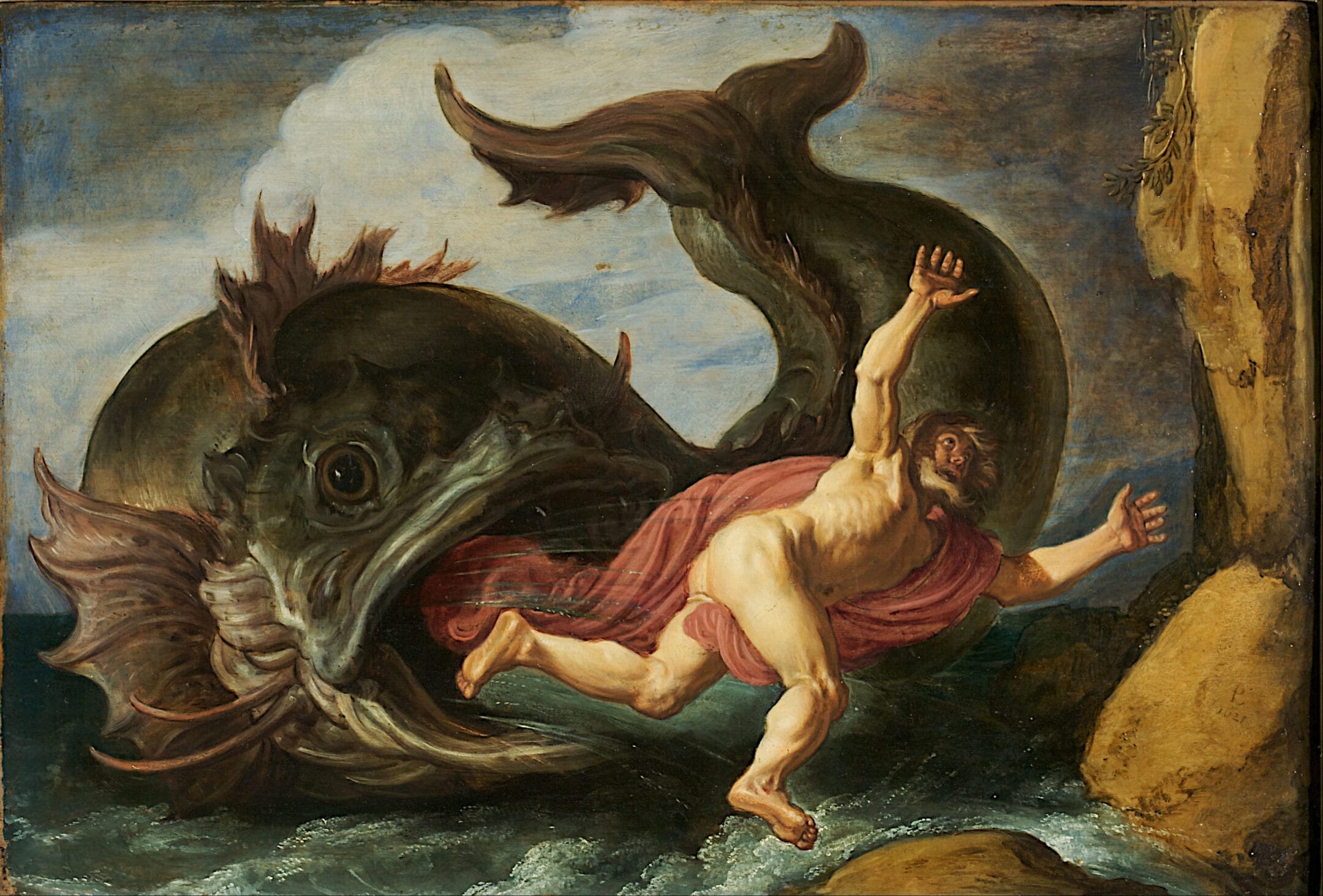The Story of Jonah (and the Whale) in The Bible.
Kristyn Berry, Volunteer Writer. | June 14, 2024

An Overview of The Book of Jonah.
You are in for a whale of a tale today! We are exploring the book of Jonah in the Bible’s Old Testament. Dive in as we navigate through the waves of Jonah’s story—from God calling on Jonah and his dramatic flight from duty to the depths of the sea where Jonah and the whale meet, and finally, to the surprising outcomes in the city of Nineveh. Along the way, we will learn more about the story of Jonah’s rebellion, redemption, and his tuning into God’s heart to learn the art of surrender, faith, and forgiveness. Jonah’s whale tale is rich with lessons that remain relevant to this day, reflecting God’s overwhelming love. Let’s dive in!
The story of Jonah takes place in Hebrew times in a city called Ninevah (modern-day Mosul, Iraq). At one time, Ninevah was a highly affluent trading and religious center which eventually became riddled with evil and sin. In the book of Jonah, chapter 1, God summons Jonah to go to Ninevah to preach against their evil and to repent or be destroyed. Jonah’s first reaction was- let’s just say- less than thrilled. Have you ever felt that way? When you must do something, but you really don’t want to do it? So much so that you think if you ignore it will eventually go away or someone else will do it? Yes. It was like that. It wasn’t high on Jonah’s to-do list; in fact, it wasn’t on his to-do list at all, and if Jonah had anything to do about it, it wasn’t going to be on his to-do list, ever. Jonah knows that God will eventually destroy the city because of their sin, taking all the Ninevites down with it, and if Jonah preaches God’s warning, and they repent, God may forgive them and show mercy.
The truth of the matter is that Jonah didn’t feel the Ninevites deserved God’s forgiveness. In fact, Jonah feels so strongly that he decides to find a boat to take him to Tarshish- 2,500 miles in the OPPOSITE direction! He was really proving his point, wasn’t he? He pays his fare, and the boat sets sail. They aren’t long into their journey when God sends a mighty wind, and a violent storm begins, threatening to wreck their ship. Jonah goes below deck and falls into a deep sleep while the rest of the crew manages the rough waters. I mean, what’s a little storm when you have the weight of fleeing from God on your mind, right?
The violent storm continues, and the men on board all start praying to their gods, begging for help and mercy on their souls. They wake Jonah and ask him to do the same. They ask him how he can sleep through this storm? He should call upon his god to save everyone! When Jonah prays, and the storm continues, they decide to cast lots to determine who is at fault. Surely someone on this ship is the reason they are being punished with a horrific storm. So, they took their lots, threw them up, and the lot landed on Jonah. The crew immediately asks what did you do to upset your God? Jonah explains he believes in the Lord, the creator of the land and sea, explains his situation and offers a solution. They would throw him into the sea. He knows he will die by drowning, and still, death is better than facing God’s will for him to go to Ninevah. The crew rejects this idea, knowing that killing an innocent man could have much larger repercussions, so they try rowing the boat back to land. The storm grows even wilder, and they determine they must listen to Jonah. The men pray for forgiveness as they cast Jonah overboard. The storm quickly subsides.
Here’s where we come across the famous story of Jonah and the whale! Jonah, sinking deep in the sea, prays for God’s mercy on his soul. God sends Jonah a whale who swallows him up and he lives in the belly of the whale for 3 days and 3 nights.
Let’s take a quick detour here. Have you ever noticed the significance of the number 3 in the Bible? It shows up quite a bit. Noah had 3 sons, Joseph and Mary received 3 gifts when Jesus was born, Jesus resurrected after 3 days. The Holy Trinity; Father, Son and Holy Spirit. It is thought that the number three biblically represents divine wholeness, completeness, and perfection. If there was a desire to highlight an idea, thought, event or noteworthy figure in the Bible for their prominence, the number three was used to put a divine stamp of completion or fulfillment on the subject.
In the three days Jonah and the whale were together, he prayed, repented and praised the Lord. In this time, he became whole, complete and aligned in God’s grace because as he sat deep in prayer, praise, and Psalms, praying for God’s deliverance, he tuned in to God’s heart. He prays, “Those who cling to worthless idols turn away from God’s love for them, But I, with shouts of grateful praise, will sacrifice to the Lord.” In the dark and desolate place, Jonah realizes the gravity of his disobedience and the need for repentance.
You see, Jonah didn’t turn away from God’s love, instead he leaned into it knowing that He is a merciful God. Jonah knows that Salvation only comes from the Lord, and his prayer of repentance is a powerful reminder of God’s mercy and forgiveness, even in the face of our own failings.
The Lord commanded the whale to bring Jonah onto the land and told Jonah to go to Ninevah to preach God’s word once again. This time, Jonah was ready for his mission. This task went straight to the top of his to-do list! For three days-there is that magic number again-Jonah tours through Ninevah and to his surprise, the city’s people heed his warning and repent of their sins. From the greatest to the least, they fast (from eating), put on sackcloth, and cry out to God for mercy. And when God sees their repentance, He decides against destroying the city.
Jonah sees this and prays to God; this is why he hesitated, Lord. He knew you would be a forgiving God and show them grace and understanding that they didn’t deserve. So, Jonah goes East of the city of Ninevah to watch what happens next. It is very hot in the desert, and Jonah can’t find shade. God makes a plant grow to provide him shade, and Jonah is relieved. He thanks God for the vine protecting him from the desert heat. Then God sends a worm to eat the plant, and it dies. After that, a blustery eastern wind makes Jonah so hot he feels faint and is miserable. He asks God for death. He says he would rather be dead than suffer in this way. God asks him if he has a right to be angry, and Jonah says yes, he does! God says you were thankful for the plant but didn’t look after it to help it grow. You didn’t feed it or care for it. Shouldn’t I have the same concern for 120,000 Ninevites and many animals?
This is where the book of Jonah ends rather abruptly, exaggerating God’s point that all are loved and cared for by His grace. The book of Jonah ends with God’s gentle rebuke of Jonah’s selfishness and shortsightedness. It is a reminder that God’s love and mercy extend to all people, regardless of their sins or background. The story of Jonah challenges us to examine our own hearts and attitudes toward those whom we deem unworthy of God’s grace. God loves each and every one of us and offers us all grace. The story of Jonah in the Bible shows us that when we get still and align ourselves with God’s heart, we, too, can extend Godlike love and grace to all, even our least favorite people.
–
Want more like this? Read the Overview of the Book of Lamentations here.

See You on Sundays!
We are one church with locations across Chicagoland and online! We meet each Sunday to connect with God and others while learning from the Bible about how to live on purpose and for a purpose. We have fantastic programs for kids and students, giving them a foundation of faith and community.
